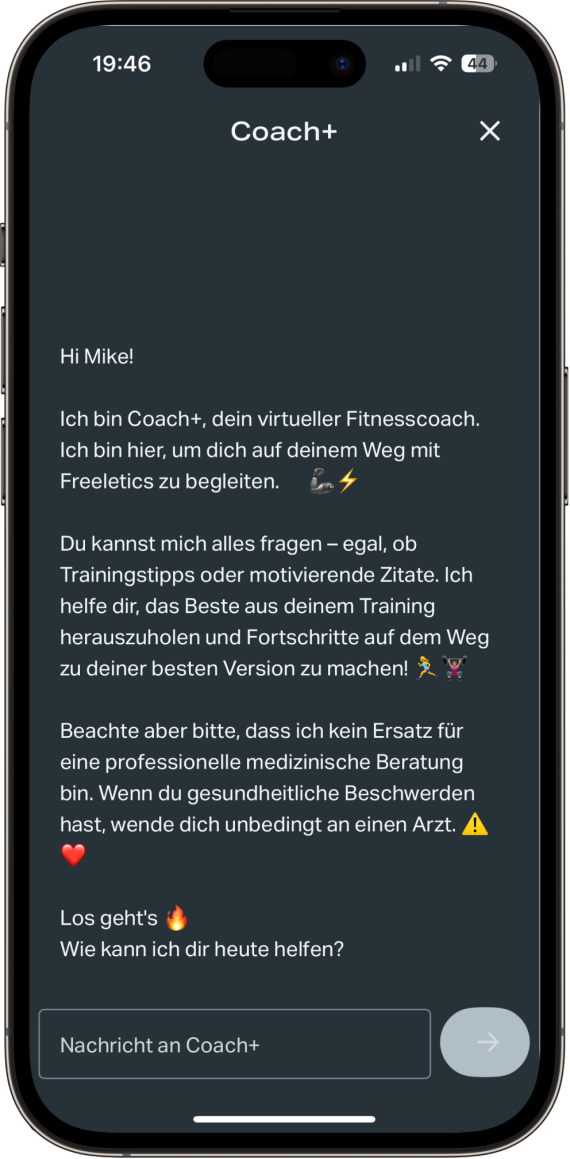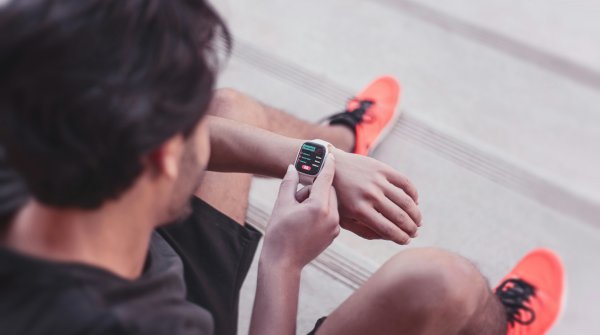- Artificial intelligence as support for trainers
- Freeletics on the road to success with AI expertise
- The AI trainer communicates like a human
- After speaking, AI learns to see
- Trainer or AI: Who corrects better?
- Early warning of injuries
- Better gymnastics with artificial intelligence
- Smart tools optimize training control
- The human being as a complete biopsychosocial system
- "Explainable AI" the decisive further development
In 2021, the Federal Institute for Sports Science conducted a study on the advance of digital training concepts. "I don't believe that trainers can be fundamentally replaced," says Prof. Dr. Alexander Asteroth, one of the authors of the study. Rather, artificial intelligence provides tools to support trainers in their work. His conclusion: "You always have to critically question what artificial intelligence suggests. And that requires expertise. And this is what - real - trainers usually bring to the table."
Despite such criticism, AI has long since found its way into popular sport. This is exemplified by the success of the fitness app Freeletics, which was launched in 2013. It is a favorite of more than 57 million amateur athletes. The training focuses on strength and endurance without equipment. The self-assessments of athletes and the training data of millions of users form a valid basis for the European market leader - according to its own assessment - on which the AI constantly adapts and improves personal training routines. Freeletics began using advanced machine learning algorithms back in 2017 and has since developed a high level of expertise.
The Feeletics Coach+ communicates individually with athletes before, during and after training. It sends personal motivational messages and reminders, answers questions about wellness, nutrition and fitness and gives tips on training technique, performance optimization and training adaptation. At the pilot launch, Coach+, which is included free of charge in Freeletics subscriptions, will initially only speak English. German and other languages are to follow.
"We're not trying to replace personal trainers," says Confidence F. Udegbue, member of the Executive Team & Director of Product and UX at Freeletics, explaining their self-image. "We just want to give everyone who can't afford or doesn't want a personal trainer the experience of a training program tailored to their needs and individual round-the-clock support."
The app motivates people to pursue long-term sporting goals and to build and enjoy a lifelong fitness habit with the right tools, the right attitude and the right coaching. With the freshly launched pilot version of Coach+, the pocket-sized AI trainer becomes even more of an emotional companion for Free Athletics. "We are using our expertise in AI and advances in the field of large language models with conversational and generative AI. In this way, our app offers human-like communication, advice and motivation in real time," says Udegbue.

Now that the Freeletics app has learned to "speak", the next step is to "see": Motion tracking solutions should allow the AI to analyze and correct the user's movements via the cell phone camera. This application is currently at an advanced stage, but is still experimental and therefore not yet integrated into the app. The "Mirror" app shows that such features already work quite well for a wide range of applications. It helps its users to perform movements correctly during fitness training.
But can remote diagnosis rule out the risk of injury? Munich-based personal trainer George Tsantalis is convinced that human trainers do not need to worry about their raison d'être: "AI cannot directly intervene in complicated movements such as squats or deadlifts if they are not performed correctly, as a personal trainer would." In general, however, Tsantalis still sees a lot of potential in the possibilities that AI offers in the long term: "As the technology is improving almost every day, it is becoming much more competitive and can certainly be even more helpful for us personal trainers and the fitness industry in the future."
Artificial intelligence is even able to predict the risk of injury. Data scientist Alessio Rossi from the University of Pisa and his team have analyzed Italian professional soccer teams over an extended period of time. The researchers fed an AI with information on training stress in order to recognize patterns in the stress data and ultimately predict injuries. The AI was able to calculate probabilities that a player could get injured in the next few days or weeks and also provide clues as to why injuries are imminent.
By combining camera data and information from wearables, AI can even solve strategic or tactical situations. This is the conclusion of the report "Artificial intelligence for elite sport in the field of tension between big and small data" by the Federal Institute of Sports Science. And in technically demanding sports that are still largely subjectively assessed by coaches or competition judges, AI can provide more objective insights and results in training and competition. This includes, for example, movement sequences in floor and apparatus gymnastics. Athletes often perform the individual elements of their exercises with strength and precision at such a high speed that it is difficult for the human eye to follow. This is where modern, AI-supported technology comes into play.
Fujitsu and the International Gymnastics Federation (FIG) have used the successful development of a scoring support system at the 52nd World Artistic Gymnastics Championships in Antwerp in October 2023. The camera-based image analysis can resolve the gymnasts' complex movements in detail in real time and from different angles. The results show the precision and detail of the exercises in unprecedented quality. Athletes can therefore expect a fair and objective assessment of their performance at competitions. However, this can also revolutionize training through targeted optimization.
Artificial intelligence in sport is becoming increasingly prevalent at all levels of training management because smart tools provide helpful data and statistics. In addition, information, experiences and feedback from users from all over the world provide the data for further development. The Enduco app, for example, first records the training of its users and integrates performance data from other sources. Taking current form and sporting goals into account, the AI-controlled coach generates a tailored plan that is adjusted according to progress. Professionals such as top British athlete Katarina Johnson-Thompson and others also use AI-based fitness coaching systems. For example, the system from US provider Vi used data from wearables such as smartwatches and fitness trackers to create personalized training plans for medal-winning athlete Johnson-Thompson.
However, the success of such apps does not mean that personal trainers are becoming superfluous. Matthias Fischer, a sports scientist and personal trainer from Heidelberg, refers to people as a complete biopsychosocial system. "Every person is too complex to train according to a standardized plan," says the owner of the company CAPECS® sports consulting. "Artificial intelligence can certainly create sensible training plans. But in practice, I see in my daily work that you have to examine the whole body and take a medical history. Not only for optimal results in muscle building, but especially for pain prevention and rehabilitation. That's where I still see the limits at the moment."
Prof. Asteroth, who works and researches training-supporting AI, among other things, also relies on human trainers. He is still predominantly skeptical about training plans automatically generated by algorithms. "But in the future, as they develop further, artificial intelligence has potential in the sports sector in the form of support systems for trainers, whether in competitive sports or in the fitness sector. In my view, however, this should never be a fully automated system, but only a supportive one.
Because we are dealing with people." The scientist does not want to commit himself to the development potential that can be expected in the coming years. In his view, Explainable AI could become a game changer. Most machine learning methods are still black box algorithms; they make statements without an explanation as to why exactly this prediction was made. However, this is crucial in training. "The AI must not only provide a plan, but also the reasoning behind it."
- Awards
- Mountain sports
- Bike
- Fitness
- Health
- ISPO Munich
- Running
- Brands
- Sustainability
- Olympia
- OutDoor
- Promotion
- Sports Business
- Textrends
- Triathlon
- Water sports
- Winter sports
- eSports
- SportsTech
- OutDoor by ISPO
- Heroes
- Transformation
- Sport Fashion
- Urban Culture
- Challenges of a CEO
- Trade fairs
- Sports
- Find the Balance
- Product reviews
- Newsletter exclusive area
- Magazine





